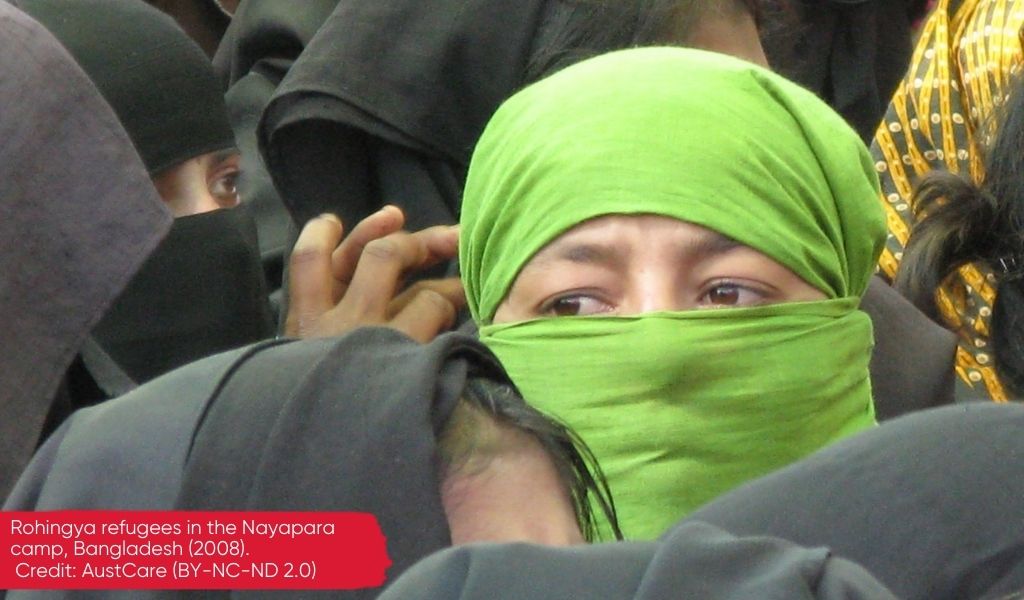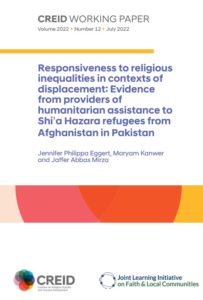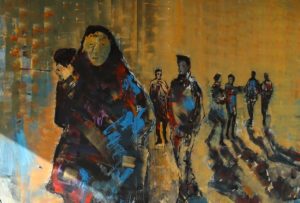A new CREID Working Paper argues that the technical approach which underpins international humanitarian practices do not recognise intersecting forms of identity, including religious ones, and this can lead to marginalisation of religious minorities. And yet, religious identity is critically important to consider in assessing patterns of displacement and the dynamics of conflict and peacebuilding, as has been witnessed with the Yazidis and the Rohingyas.

Rohingya refugees in the Nayapara camp, Bangladesh (2008). Credit. AustCare (CC BY-NC-ND 2.0)
Responding to famines, tending to the wounded and providing protection to refugees are examples of humanitarian action which stretch back across history of humanity and across nations and religions.
Modern humanitarianism is more commonly associated, however, with the ideas and actions of Swiss businessman Henry Dunant, co-founder of the Red Cross, and British nurse Florence Nightingale, who established principles for modern nursing. Both were involved in tending to the wounded in the aftermath of bloody military conflict in the 1800s. Dunant was a firm believer in the principles of neutrality and impartiality, incorporated in the First Geneva Convention of 1864, and which remain key humanitarian principles to this day.
Are principles of neutrality and impartiality detrimental to religious minorities?
New research from CREID warns, however, that such neutrality could in fact exacerbate pre-existing inequalities rather than mitigate them. And whilst the consequences of other forms of inequalities, for example around gender or disability, are now well recognised by international humanitarian institutions and protocols, religious inequalities remain conspicuous by their absence. At the recent World Humanitarian Forum, religious inequalities were mentioned only once (see Outcome report).
Yet, religious identity is critically important to consider in assessing patterns of displacement and the dynamics of conflict and peace-building, as well as programmatic and policy responses to humanitarian crises.
Conflicts are frequently driven by discrimination and generate massive numbers of refugees and internally displaced persons (IDPs) as they flee from persecution and violence, whilst individuals or groups may be targeted for their identity or face insecurity during community activities. By 2019, levels of displacement were the highest on record, with the United Nations High Commissioner for Refugees (UNHCR) estimating that there were more than 79.5 million forcibly displaced people globally (UNHCR 2020). In 2018 alone, more than 13 million fled war, violence, and persecution.
In this paper, the authors have shown that in any given crisis or conflict, with the Covid pandemic being the latest illustration (see CREID series on religious inequalities and Covid-19), different forms of identities including religious ones and vulnerabilities can lead to marginalisation.
But the overall response to religious marginalisation has been limited due to the secular nature of the institutional architecture of the global humanitarian system, and the taboo around religious identity (see Katherine Marshall in this video at 6mins17s). The genesis of the humanitarian system shows that it has adopted a language that both excludes religion and inequalities as part of its lexicon as a particular (western/secular) interpretation of humanitarian principles holds sway in much humanitarian practice. As a result, the needs of marginalised communities are often left unaddressed, and the capacities of religious actors as partners in humanitarian actions remain untapped.
There are still many research gaps both in academic scholarship and policy framing around religious pluralism in the context of humanitarianism whilst appropriate responses to the problems and challenges outlined in the paper are far from clear. The solution may lie in developing a broader intersectional approach to identify and address religious inequality in humanitarian response. This will ensure that programmatic responses are developed to pursue better linkages of human rights frameworks with local dynamics and political realities concerning the situation of religious minorities.



